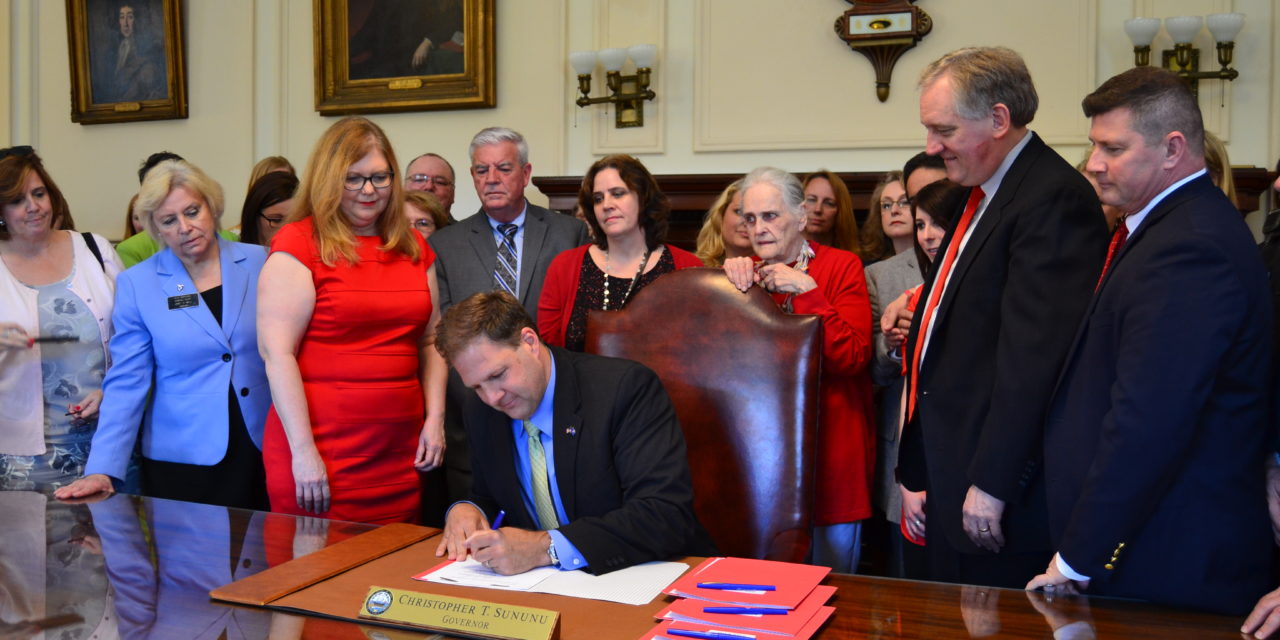Please see below for Governor Chris Sununu’s abridged remarks at today’s press conference with the Marriott Family, advocates, survivors and lawmakers, prior to signing four bipartisan bills into law aimed at improving the rights of crime victims in New Hampshire.
Good afternoon and thank you all for being here. I’m glad to be here to commemorate the passage of 4 important bills aimed at improving the rights of crime victims in New Hampshire.
It’s ceremonies like these that represent the best and most important work that we do in state government, and that is protecting our most vulnerable citizens and giving a voice to those who are unable to speak for themselves.
These bills advance the legal rights for underage human trafficking victims; enhance protections for child victims of sexual abuse; and ensure that victims of sexual assault have privacy rights throughout the criminal justice process.
These bills were all passed with strong bipartisan support, and today’s ceremony highlights that these issues are everyone’s issues. Sadly, we know statistically that sexual and domestic violence will touch someone’s life that we know at one point or another—whether it is a neighbor, a loved one, or ourselves. We can and must always work together to keep victims and children in New Hampshire safe.
Through the incredible work of the Marriott family and others who have been affected by violence, the Coalition Against Domestic and Sexual Violence and their 13 crisis centers, the Attorney General’s Office and our law enforcement community, and all those working to end violence, New Hampshire is the model that states across the country look to when working to create safe communities without violence and abuse.
We are all united in this fight, across party lines, and we will keep working together to ensure every Granite Stater in crisis has the help and legal protections that they need. I thank you all for your commitment to this fight, and today we celebrate how far we’ve come, with an eye toward how far we still have to go to ensure that victims have equal rights to offenders under the law.
First I will sign Senate Bill 166, which will make it easier for victims that become pregnant as a result of rape to terminate the parental rights of their abuser.
This bill was inspired by a young woman who carried the burden of having to prove that her abuser shouldn’t have any access to her or her child.
With the passage of SB 166, this burden will no longer lie with the mother to prove anything. As a result, more victims in this horrendous situation will be empowered to raise their children, if they choose, and to do so without fear for their safety.
I will also sign House Bill 94, which amends New Hampshire’s human trafficking statute. The bill makes clear that neither lack of knowledge of a victim’s age, nor the “consent” of a minor, can be used as a defense in human trafficking cases.
I will also sign House Bill 220, which changes definitions to better reflect the heinous nature of predatory crimes against children.
These criminals are sexually abusing children and re-victimizing them each and every time another person views their crime. This legislation is another important step clamping down on internet based predatory offenders.
And last I will sign Senate Bill 9.
This legislation was introduced in response to a recent NH Supreme Court decision and strengthens NH’s Rape Shield Law to ensure that the private, unrelated sexual history of sexual assault victims will not be used against them in any court proceeding.
This bill seeks to do two critical things. First: it will ensure that the private, unrelated sexual history of victims will remain sealed in all NH court proceedings, including on appeal. Second: it defines “sexual activity” for the purposes of rape shield.
This is the most critical piece of the bill, as it will give judges guidance in application of rape shield protections, and will make clear what protections are afforded to victims in rape cases. This bill strikes a balance between protecting victims’ privacy while not infringing on defendants’ due process rights, and lays out a procedure for defense attorneys wishing to have a judge rule on evidence they wish to submit.
Next I am honored to introduce Bob and Melissa Marriott, the mother and father Lizzi Marriott, who will share more with you about the case that lead to the filing of this important legislation.



